E-marketing’s impact on consumer purchase decisions in the U.K retail businesses: A study on Primark Retail Company
VerifiedAdded on 2023/06/11
|12
|2572
|370
AI Summary
This study aims to analyze the impact of e-marketing on consumer purchase decisions in the UK retail businesses, with a focus on Primark Retail Company. The objectives include determining the concept of e-marketing, examining the strategies adopted by Primark, assessing the challenges, and evaluating the impact. The methodology involves using the deductive approach, positivism philosophy, and survey strategy to collect primary data from 50 respondents. The ethical considerations include respect for autonomy, scientific integrity, social responsibility, and maximizing benefit while minimizing harm.
Contribute Materials
Your contribution can guide someone’s learning journey. Share your
documents today.
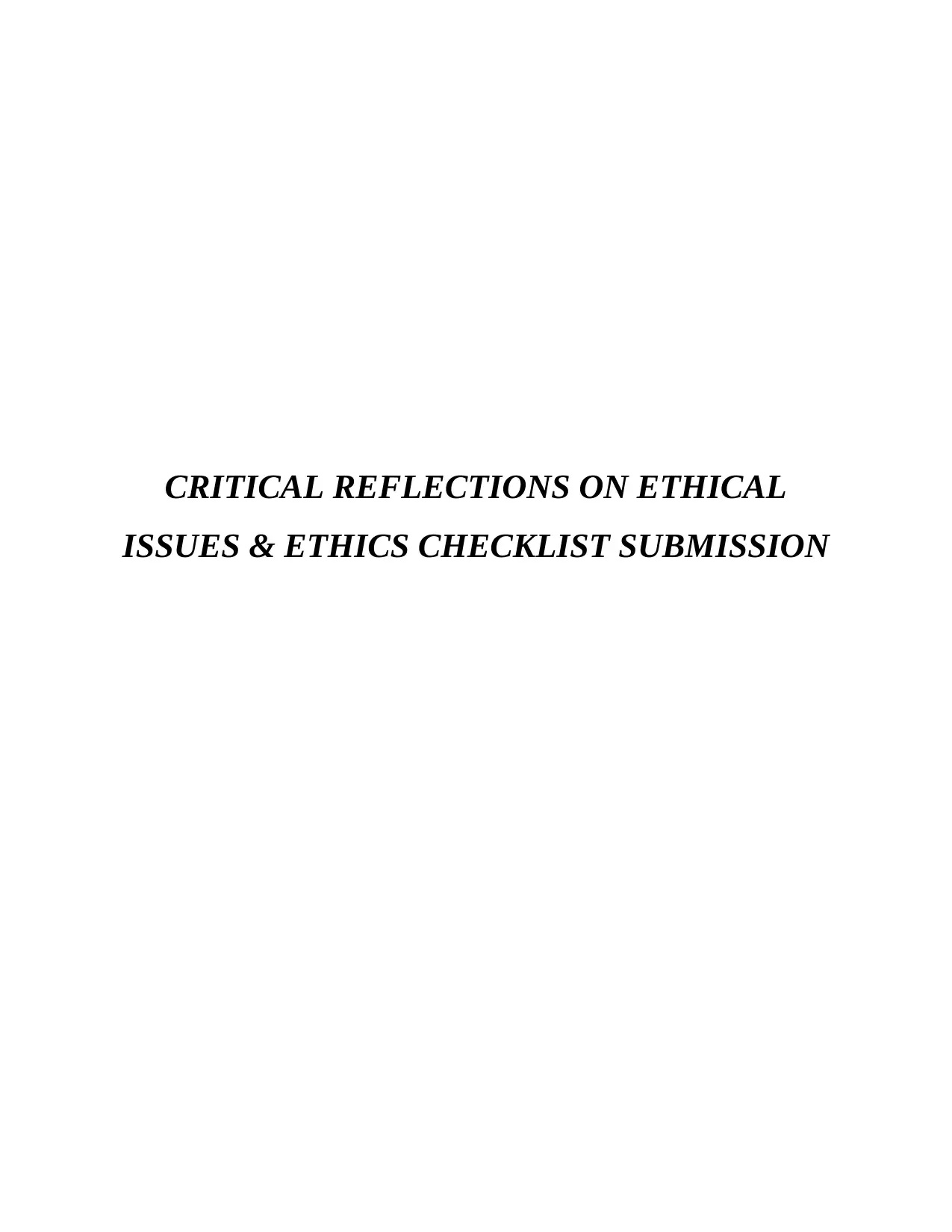
CRITICAL REFLECTIONS ON ETHICAL
ISSUES & ETHICS CHECKLIST SUBMISSION
ISSUES & ETHICS CHECKLIST SUBMISSION
Secure Best Marks with AI Grader
Need help grading? Try our AI Grader for instant feedback on your assignments.
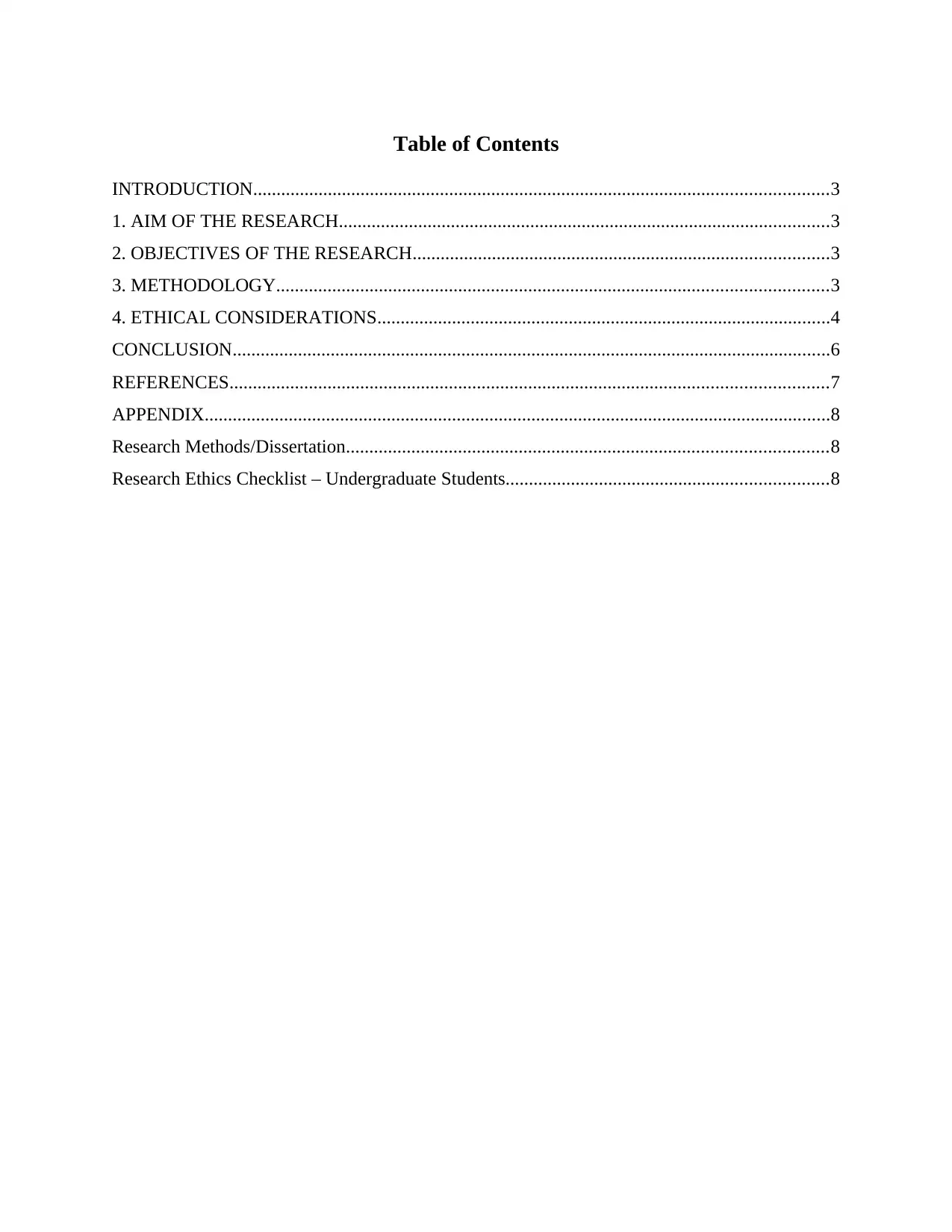
Table of Contents
INTRODUCTION...........................................................................................................................3
1. AIM OF THE RESEARCH.........................................................................................................3
2. OBJECTIVES OF THE RESEARCH.........................................................................................3
3. METHODOLOGY......................................................................................................................3
4. ETHICAL CONSIDERATIONS.................................................................................................4
CONCLUSION................................................................................................................................6
REFERENCES................................................................................................................................7
APPENDIX......................................................................................................................................8
Research Methods/Dissertation.......................................................................................................8
Research Ethics Checklist – Undergraduate Students.....................................................................8
INTRODUCTION...........................................................................................................................3
1. AIM OF THE RESEARCH.........................................................................................................3
2. OBJECTIVES OF THE RESEARCH.........................................................................................3
3. METHODOLOGY......................................................................................................................3
4. ETHICAL CONSIDERATIONS.................................................................................................4
CONCLUSION................................................................................................................................6
REFERENCES................................................................................................................................7
APPENDIX......................................................................................................................................8
Research Methods/Dissertation.......................................................................................................8
Research Ethics Checklist – Undergraduate Students.....................................................................8
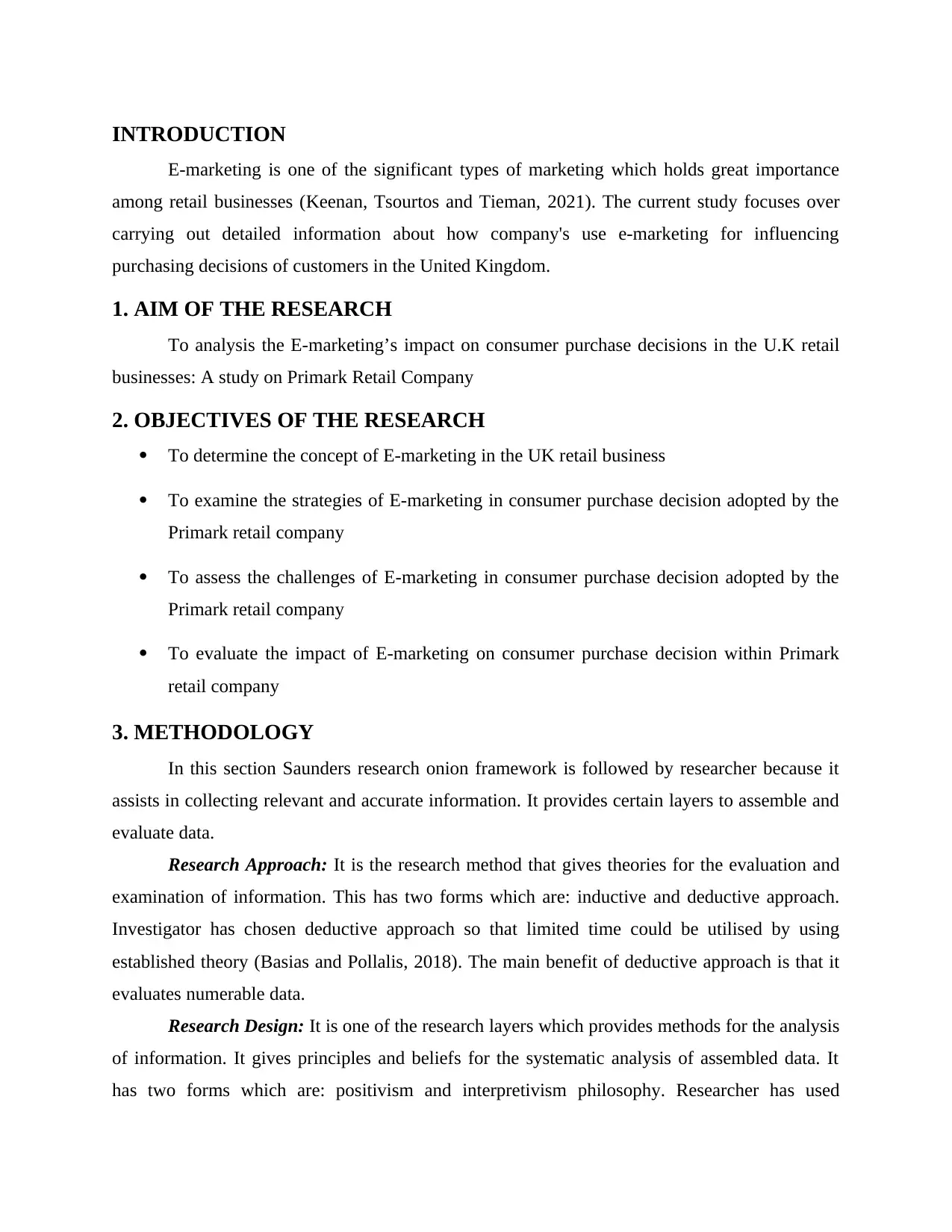
INTRODUCTION
E-marketing is one of the significant types of marketing which holds great importance
among retail businesses (Keenan, Tsourtos and Tieman, 2021). The current study focuses over
carrying out detailed information about how company's use e-marketing for influencing
purchasing decisions of customers in the United Kingdom.
1. AIM OF THE RESEARCH
To analysis the E-marketing’s impact on consumer purchase decisions in the U.K retail
businesses: A study on Primark Retail Company
2. OBJECTIVES OF THE RESEARCH
To determine the concept of E-marketing in the UK retail business
To examine the strategies of E-marketing in consumer purchase decision adopted by the
Primark retail company
To assess the challenges of E-marketing in consumer purchase decision adopted by the
Primark retail company
To evaluate the impact of E-marketing on consumer purchase decision within Primark
retail company
3. METHODOLOGY
In this section Saunders research onion framework is followed by researcher because it
assists in collecting relevant and accurate information. It provides certain layers to assemble and
evaluate data.
Research Approach: It is the research method that gives theories for the evaluation and
examination of information. This has two forms which are: inductive and deductive approach.
Investigator has chosen deductive approach so that limited time could be utilised by using
established theory (Basias and Pollalis, 2018). The main benefit of deductive approach is that it
evaluates numerable data.
Research Design: It is one of the research layers which provides methods for the analysis
of information. It gives principles and beliefs for the systematic analysis of assembled data. It
has two forms which are: positivism and interpretivism philosophy. Researcher has used
E-marketing is one of the significant types of marketing which holds great importance
among retail businesses (Keenan, Tsourtos and Tieman, 2021). The current study focuses over
carrying out detailed information about how company's use e-marketing for influencing
purchasing decisions of customers in the United Kingdom.
1. AIM OF THE RESEARCH
To analysis the E-marketing’s impact on consumer purchase decisions in the U.K retail
businesses: A study on Primark Retail Company
2. OBJECTIVES OF THE RESEARCH
To determine the concept of E-marketing in the UK retail business
To examine the strategies of E-marketing in consumer purchase decision adopted by the
Primark retail company
To assess the challenges of E-marketing in consumer purchase decision adopted by the
Primark retail company
To evaluate the impact of E-marketing on consumer purchase decision within Primark
retail company
3. METHODOLOGY
In this section Saunders research onion framework is followed by researcher because it
assists in collecting relevant and accurate information. It provides certain layers to assemble and
evaluate data.
Research Approach: It is the research method that gives theories for the evaluation and
examination of information. This has two forms which are: inductive and deductive approach.
Investigator has chosen deductive approach so that limited time could be utilised by using
established theory (Basias and Pollalis, 2018). The main benefit of deductive approach is that it
evaluates numerable data.
Research Design: It is one of the research layers which provides methods for the analysis
of information. It gives principles and beliefs for the systematic analysis of assembled data. It
has two forms which are: positivism and interpretivism philosophy. Researcher has used
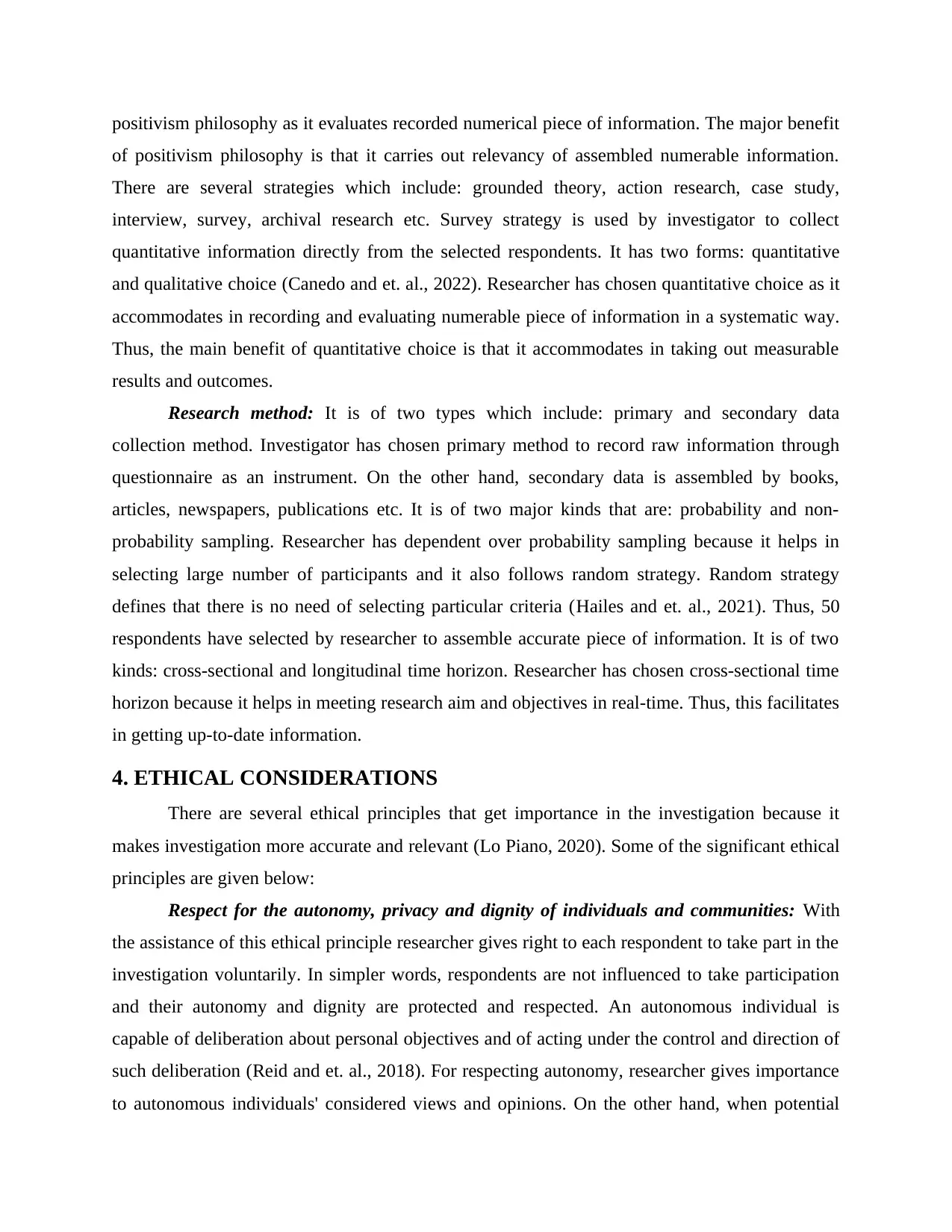
positivism philosophy as it evaluates recorded numerical piece of information. The major benefit
of positivism philosophy is that it carries out relevancy of assembled numerable information.
There are several strategies which include: grounded theory, action research, case study,
interview, survey, archival research etc. Survey strategy is used by investigator to collect
quantitative information directly from the selected respondents. It has two forms: quantitative
and qualitative choice (Canedo and et. al., 2022). Researcher has chosen quantitative choice as it
accommodates in recording and evaluating numerable piece of information in a systematic way.
Thus, the main benefit of quantitative choice is that it accommodates in taking out measurable
results and outcomes.
Research method: It is of two types which include: primary and secondary data
collection method. Investigator has chosen primary method to record raw information through
questionnaire as an instrument. On the other hand, secondary data is assembled by books,
articles, newspapers, publications etc. It is of two major kinds that are: probability and non-
probability sampling. Researcher has dependent over probability sampling because it helps in
selecting large number of participants and it also follows random strategy. Random strategy
defines that there is no need of selecting particular criteria (Hailes and et. al., 2021). Thus, 50
respondents have selected by researcher to assemble accurate piece of information. It is of two
kinds: cross-sectional and longitudinal time horizon. Researcher has chosen cross-sectional time
horizon because it helps in meeting research aim and objectives in real-time. Thus, this facilitates
in getting up-to-date information.
4. ETHICAL CONSIDERATIONS
There are several ethical principles that get importance in the investigation because it
makes investigation more accurate and relevant (Lo Piano, 2020). Some of the significant ethical
principles are given below:
Respect for the autonomy, privacy and dignity of individuals and communities: With
the assistance of this ethical principle researcher gives right to each respondent to take part in the
investigation voluntarily. In simpler words, respondents are not influenced to take participation
and their autonomy and dignity are protected and respected. An autonomous individual is
capable of deliberation about personal objectives and of acting under the control and direction of
such deliberation (Reid and et. al., 2018). For respecting autonomy, researcher gives importance
to autonomous individuals' considered views and opinions. On the other hand, when potential
of positivism philosophy is that it carries out relevancy of assembled numerable information.
There are several strategies which include: grounded theory, action research, case study,
interview, survey, archival research etc. Survey strategy is used by investigator to collect
quantitative information directly from the selected respondents. It has two forms: quantitative
and qualitative choice (Canedo and et. al., 2022). Researcher has chosen quantitative choice as it
accommodates in recording and evaluating numerable piece of information in a systematic way.
Thus, the main benefit of quantitative choice is that it accommodates in taking out measurable
results and outcomes.
Research method: It is of two types which include: primary and secondary data
collection method. Investigator has chosen primary method to record raw information through
questionnaire as an instrument. On the other hand, secondary data is assembled by books,
articles, newspapers, publications etc. It is of two major kinds that are: probability and non-
probability sampling. Researcher has dependent over probability sampling because it helps in
selecting large number of participants and it also follows random strategy. Random strategy
defines that there is no need of selecting particular criteria (Hailes and et. al., 2021). Thus, 50
respondents have selected by researcher to assemble accurate piece of information. It is of two
kinds: cross-sectional and longitudinal time horizon. Researcher has chosen cross-sectional time
horizon because it helps in meeting research aim and objectives in real-time. Thus, this facilitates
in getting up-to-date information.
4. ETHICAL CONSIDERATIONS
There are several ethical principles that get importance in the investigation because it
makes investigation more accurate and relevant (Lo Piano, 2020). Some of the significant ethical
principles are given below:
Respect for the autonomy, privacy and dignity of individuals and communities: With
the assistance of this ethical principle researcher gives right to each respondent to take part in the
investigation voluntarily. In simpler words, respondents are not influenced to take participation
and their autonomy and dignity are protected and respected. An autonomous individual is
capable of deliberation about personal objectives and of acting under the control and direction of
such deliberation (Reid and et. al., 2018). For respecting autonomy, researcher gives importance
to autonomous individuals' considered views and opinions. On the other hand, when potential
Secure Best Marks with AI Grader
Need help grading? Try our AI Grader for instant feedback on your assignments.
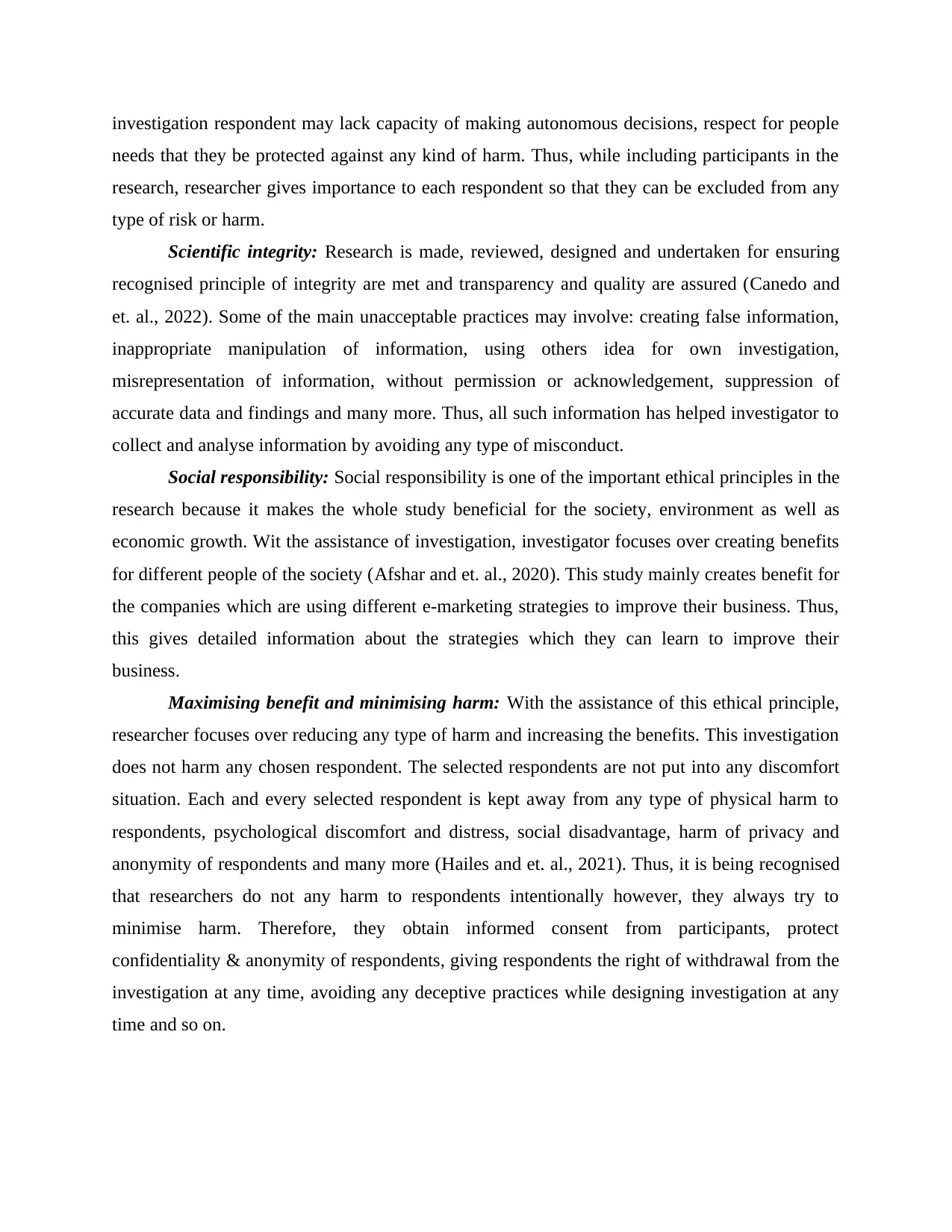
investigation respondent may lack capacity of making autonomous decisions, respect for people
needs that they be protected against any kind of harm. Thus, while including participants in the
research, researcher gives importance to each respondent so that they can be excluded from any
type of risk or harm.
Scientific integrity: Research is made, reviewed, designed and undertaken for ensuring
recognised principle of integrity are met and transparency and quality are assured (Canedo and
et. al., 2022). Some of the main unacceptable practices may involve: creating false information,
inappropriate manipulation of information, using others idea for own investigation,
misrepresentation of information, without permission or acknowledgement, suppression of
accurate data and findings and many more. Thus, all such information has helped investigator to
collect and analyse information by avoiding any type of misconduct.
Social responsibility: Social responsibility is one of the important ethical principles in the
research because it makes the whole study beneficial for the society, environment as well as
economic growth. Wit the assistance of investigation, investigator focuses over creating benefits
for different people of the society (Afshar and et. al., 2020). This study mainly creates benefit for
the companies which are using different e-marketing strategies to improve their business. Thus,
this gives detailed information about the strategies which they can learn to improve their
business.
Maximising benefit and minimising harm: With the assistance of this ethical principle,
researcher focuses over reducing any type of harm and increasing the benefits. This investigation
does not harm any chosen respondent. The selected respondents are not put into any discomfort
situation. Each and every selected respondent is kept away from any type of physical harm to
respondents, psychological discomfort and distress, social disadvantage, harm of privacy and
anonymity of respondents and many more (Hailes and et. al., 2021). Thus, it is being recognised
that researchers do not any harm to respondents intentionally however, they always try to
minimise harm. Therefore, they obtain informed consent from participants, protect
confidentiality & anonymity of respondents, giving respondents the right of withdrawal from the
investigation at any time, avoiding any deceptive practices while designing investigation at any
time and so on.
needs that they be protected against any kind of harm. Thus, while including participants in the
research, researcher gives importance to each respondent so that they can be excluded from any
type of risk or harm.
Scientific integrity: Research is made, reviewed, designed and undertaken for ensuring
recognised principle of integrity are met and transparency and quality are assured (Canedo and
et. al., 2022). Some of the main unacceptable practices may involve: creating false information,
inappropriate manipulation of information, using others idea for own investigation,
misrepresentation of information, without permission or acknowledgement, suppression of
accurate data and findings and many more. Thus, all such information has helped investigator to
collect and analyse information by avoiding any type of misconduct.
Social responsibility: Social responsibility is one of the important ethical principles in the
research because it makes the whole study beneficial for the society, environment as well as
economic growth. Wit the assistance of investigation, investigator focuses over creating benefits
for different people of the society (Afshar and et. al., 2020). This study mainly creates benefit for
the companies which are using different e-marketing strategies to improve their business. Thus,
this gives detailed information about the strategies which they can learn to improve their
business.
Maximising benefit and minimising harm: With the assistance of this ethical principle,
researcher focuses over reducing any type of harm and increasing the benefits. This investigation
does not harm any chosen respondent. The selected respondents are not put into any discomfort
situation. Each and every selected respondent is kept away from any type of physical harm to
respondents, psychological discomfort and distress, social disadvantage, harm of privacy and
anonymity of respondents and many more (Hailes and et. al., 2021). Thus, it is being recognised
that researchers do not any harm to respondents intentionally however, they always try to
minimise harm. Therefore, they obtain informed consent from participants, protect
confidentiality & anonymity of respondents, giving respondents the right of withdrawal from the
investigation at any time, avoiding any deceptive practices while designing investigation at any
time and so on.

CONCLUSION
As per the above gathered data, it is summarised that ethical principles are necessary for
completing the investigation in an ethical manner. This report has covered various ethical
principles which were required to meet each research aim, objective and question.
As per the above gathered data, it is summarised that ethical principles are necessary for
completing the investigation in an ethical manner. This report has covered various ethical
principles which were required to meet each research aim, objective and question.
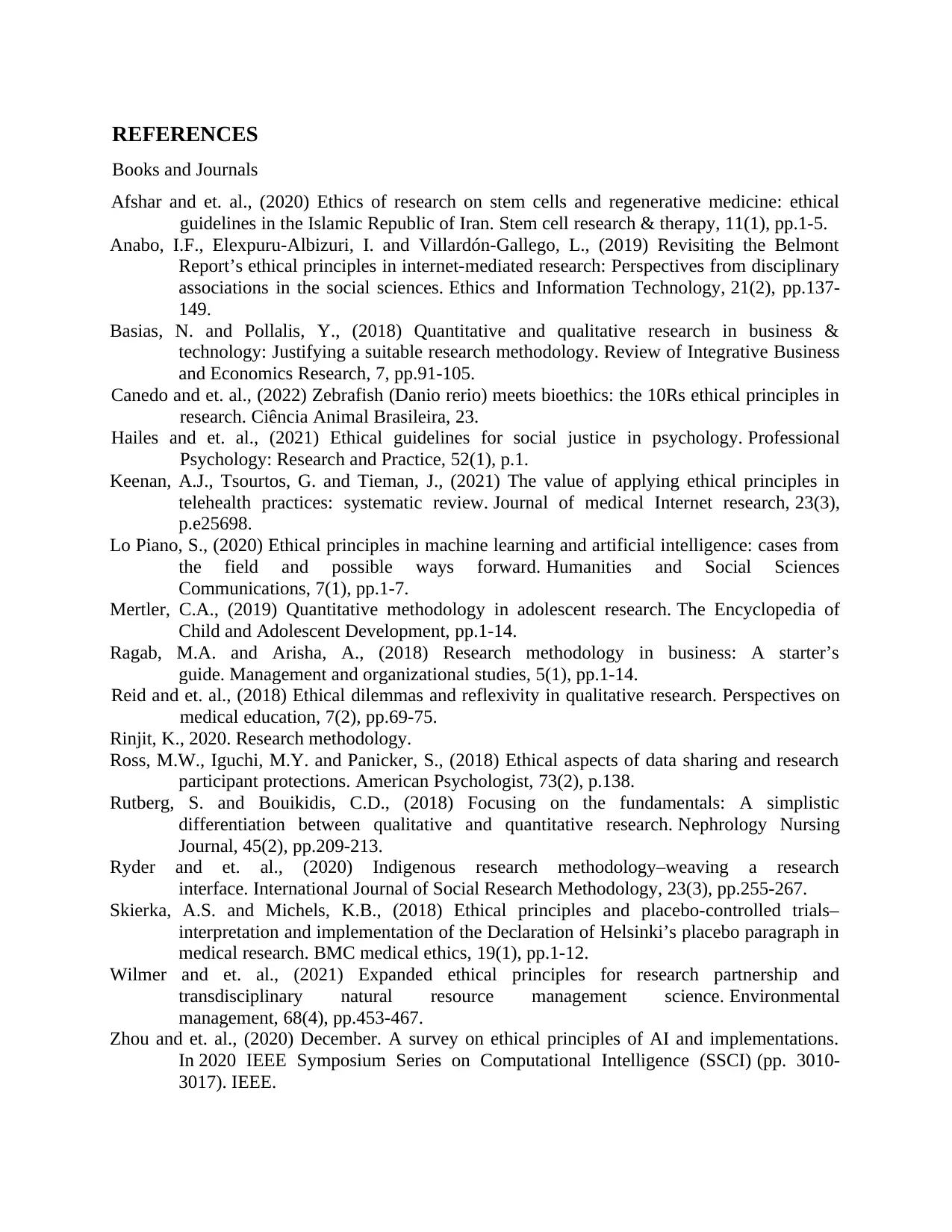
REFERENCES
Books and Journals
Afshar and et. al., (2020) Ethics of research on stem cells and regenerative medicine: ethical
guidelines in the Islamic Republic of Iran. Stem cell research & therapy, 11(1), pp.1-5.
Anabo, I.F., Elexpuru-Albizuri, I. and Villardón-Gallego, L., (2019) Revisiting the Belmont
Report’s ethical principles in internet-mediated research: Perspectives from disciplinary
associations in the social sciences. Ethics and Information Technology, 21(2), pp.137-
149.
Basias, N. and Pollalis, Y., (2018) Quantitative and qualitative research in business &
technology: Justifying a suitable research methodology. Review of Integrative Business
and Economics Research, 7, pp.91-105.
Canedo and et. al., (2022) Zebrafish (Danio rerio) meets bioethics: the 10Rs ethical principles in
research. Ciência Animal Brasileira, 23.
Hailes and et. al., (2021) Ethical guidelines for social justice in psychology. Professional
Psychology: Research and Practice, 52(1), p.1.
Keenan, A.J., Tsourtos, G. and Tieman, J., (2021) The value of applying ethical principles in
telehealth practices: systematic review. Journal of medical Internet research, 23(3),
p.e25698.
Lo Piano, S., (2020) Ethical principles in machine learning and artificial intelligence: cases from
the field and possible ways forward. Humanities and Social Sciences
Communications, 7(1), pp.1-7.
Mertler, C.A., (2019) Quantitative methodology in adolescent research. The Encyclopedia of
Child and Adolescent Development, pp.1-14.
Ragab, M.A. and Arisha, A., (2018) Research methodology in business: A starter’s
guide. Management and organizational studies, 5(1), pp.1-14.
Reid and et. al., (2018) Ethical dilemmas and reflexivity in qualitative research. Perspectives on
medical education, 7(2), pp.69-75.
Rinjit, K., 2020. Research methodology.
Ross, M.W., Iguchi, M.Y. and Panicker, S., (2018) Ethical aspects of data sharing and research
participant protections. American Psychologist, 73(2), p.138.
Rutberg, S. and Bouikidis, C.D., (2018) Focusing on the fundamentals: A simplistic
differentiation between qualitative and quantitative research. Nephrology Nursing
Journal, 45(2), pp.209-213.
Ryder and et. al., (2020) Indigenous research methodology–weaving a research
interface. International Journal of Social Research Methodology, 23(3), pp.255-267.
Skierka, A.S. and Michels, K.B., (2018) Ethical principles and placebo-controlled trials–
interpretation and implementation of the Declaration of Helsinki’s placebo paragraph in
medical research. BMC medical ethics, 19(1), pp.1-12.
Wilmer and et. al., (2021) Expanded ethical principles for research partnership and
transdisciplinary natural resource management science. Environmental
management, 68(4), pp.453-467.
Zhou and et. al., (2020) December. A survey on ethical principles of AI and implementations.
In 2020 IEEE Symposium Series on Computational Intelligence (SSCI) (pp. 3010-
3017). IEEE.
Books and Journals
Afshar and et. al., (2020) Ethics of research on stem cells and regenerative medicine: ethical
guidelines in the Islamic Republic of Iran. Stem cell research & therapy, 11(1), pp.1-5.
Anabo, I.F., Elexpuru-Albizuri, I. and Villardón-Gallego, L., (2019) Revisiting the Belmont
Report’s ethical principles in internet-mediated research: Perspectives from disciplinary
associations in the social sciences. Ethics and Information Technology, 21(2), pp.137-
149.
Basias, N. and Pollalis, Y., (2018) Quantitative and qualitative research in business &
technology: Justifying a suitable research methodology. Review of Integrative Business
and Economics Research, 7, pp.91-105.
Canedo and et. al., (2022) Zebrafish (Danio rerio) meets bioethics: the 10Rs ethical principles in
research. Ciência Animal Brasileira, 23.
Hailes and et. al., (2021) Ethical guidelines for social justice in psychology. Professional
Psychology: Research and Practice, 52(1), p.1.
Keenan, A.J., Tsourtos, G. and Tieman, J., (2021) The value of applying ethical principles in
telehealth practices: systematic review. Journal of medical Internet research, 23(3),
p.e25698.
Lo Piano, S., (2020) Ethical principles in machine learning and artificial intelligence: cases from
the field and possible ways forward. Humanities and Social Sciences
Communications, 7(1), pp.1-7.
Mertler, C.A., (2019) Quantitative methodology in adolescent research. The Encyclopedia of
Child and Adolescent Development, pp.1-14.
Ragab, M.A. and Arisha, A., (2018) Research methodology in business: A starter’s
guide. Management and organizational studies, 5(1), pp.1-14.
Reid and et. al., (2018) Ethical dilemmas and reflexivity in qualitative research. Perspectives on
medical education, 7(2), pp.69-75.
Rinjit, K., 2020. Research methodology.
Ross, M.W., Iguchi, M.Y. and Panicker, S., (2018) Ethical aspects of data sharing and research
participant protections. American Psychologist, 73(2), p.138.
Rutberg, S. and Bouikidis, C.D., (2018) Focusing on the fundamentals: A simplistic
differentiation between qualitative and quantitative research. Nephrology Nursing
Journal, 45(2), pp.209-213.
Ryder and et. al., (2020) Indigenous research methodology–weaving a research
interface. International Journal of Social Research Methodology, 23(3), pp.255-267.
Skierka, A.S. and Michels, K.B., (2018) Ethical principles and placebo-controlled trials–
interpretation and implementation of the Declaration of Helsinki’s placebo paragraph in
medical research. BMC medical ethics, 19(1), pp.1-12.
Wilmer and et. al., (2021) Expanded ethical principles for research partnership and
transdisciplinary natural resource management science. Environmental
management, 68(4), pp.453-467.
Zhou and et. al., (2020) December. A survey on ethical principles of AI and implementations.
In 2020 IEEE Symposium Series on Computational Intelligence (SSCI) (pp. 3010-
3017). IEEE.
Paraphrase This Document
Need a fresh take? Get an instant paraphrase of this document with our AI Paraphraser
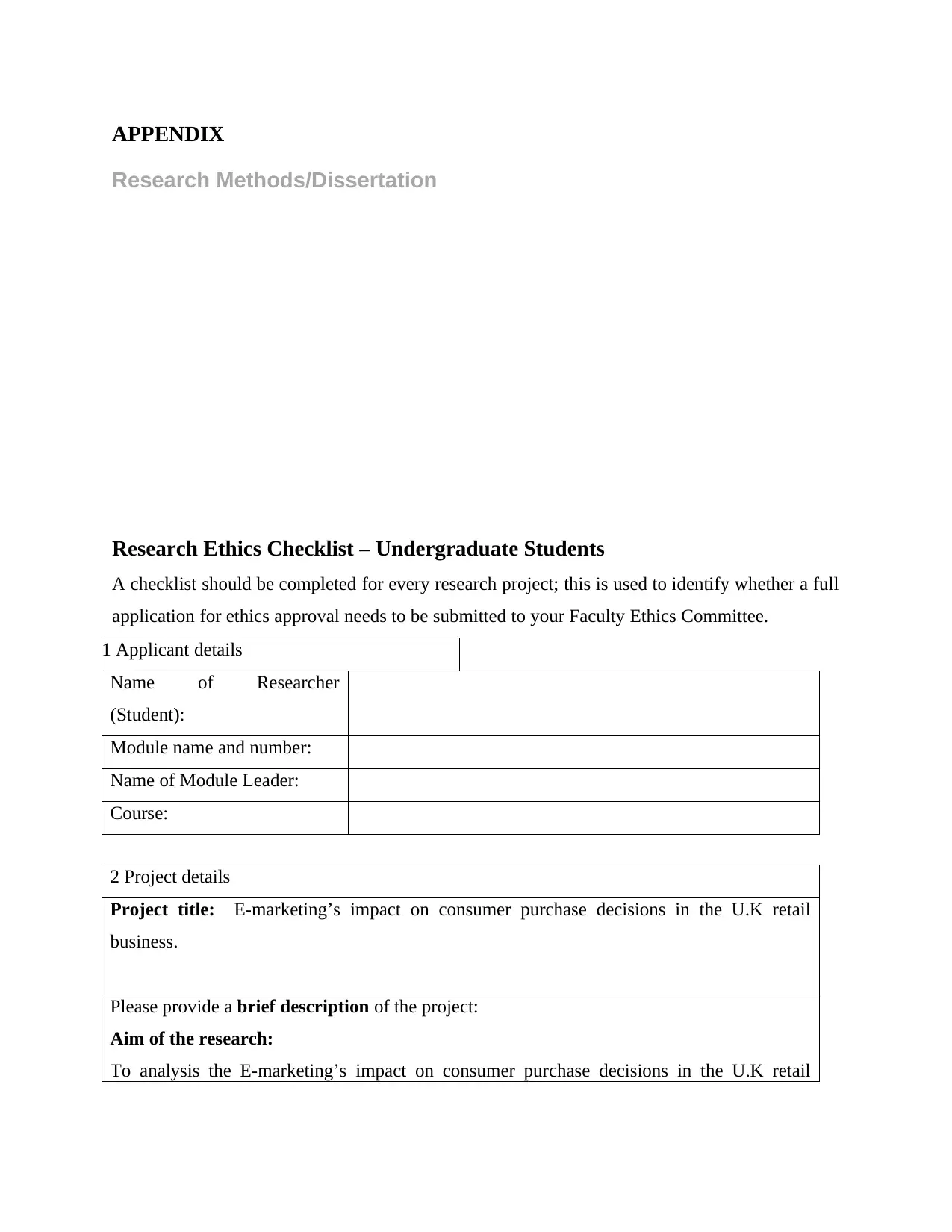
APPENDIX
Research Methods/Dissertation
Research Ethics Checklist – Undergraduate Students
A checklist should be completed for every research project; this is used to identify whether a full
application for ethics approval needs to be submitted to your Faculty Ethics Committee.
1 Applicant details
Name of Researcher
(Student):
Module name and number:
Name of Module Leader:
Course:
2 Project details
Project title: E-marketing’s impact on consumer purchase decisions in the U.K retail
business.
Please provide a brief description of the project:
Aim of the research:
To analysis the E-marketing’s impact on consumer purchase decisions in the U.K retail
Research Methods/Dissertation
Research Ethics Checklist – Undergraduate Students
A checklist should be completed for every research project; this is used to identify whether a full
application for ethics approval needs to be submitted to your Faculty Ethics Committee.
1 Applicant details
Name of Researcher
(Student):
Module name and number:
Name of Module Leader:
Course:
2 Project details
Project title: E-marketing’s impact on consumer purchase decisions in the U.K retail
business.
Please provide a brief description of the project:
Aim of the research:
To analysis the E-marketing’s impact on consumer purchase decisions in the U.K retail
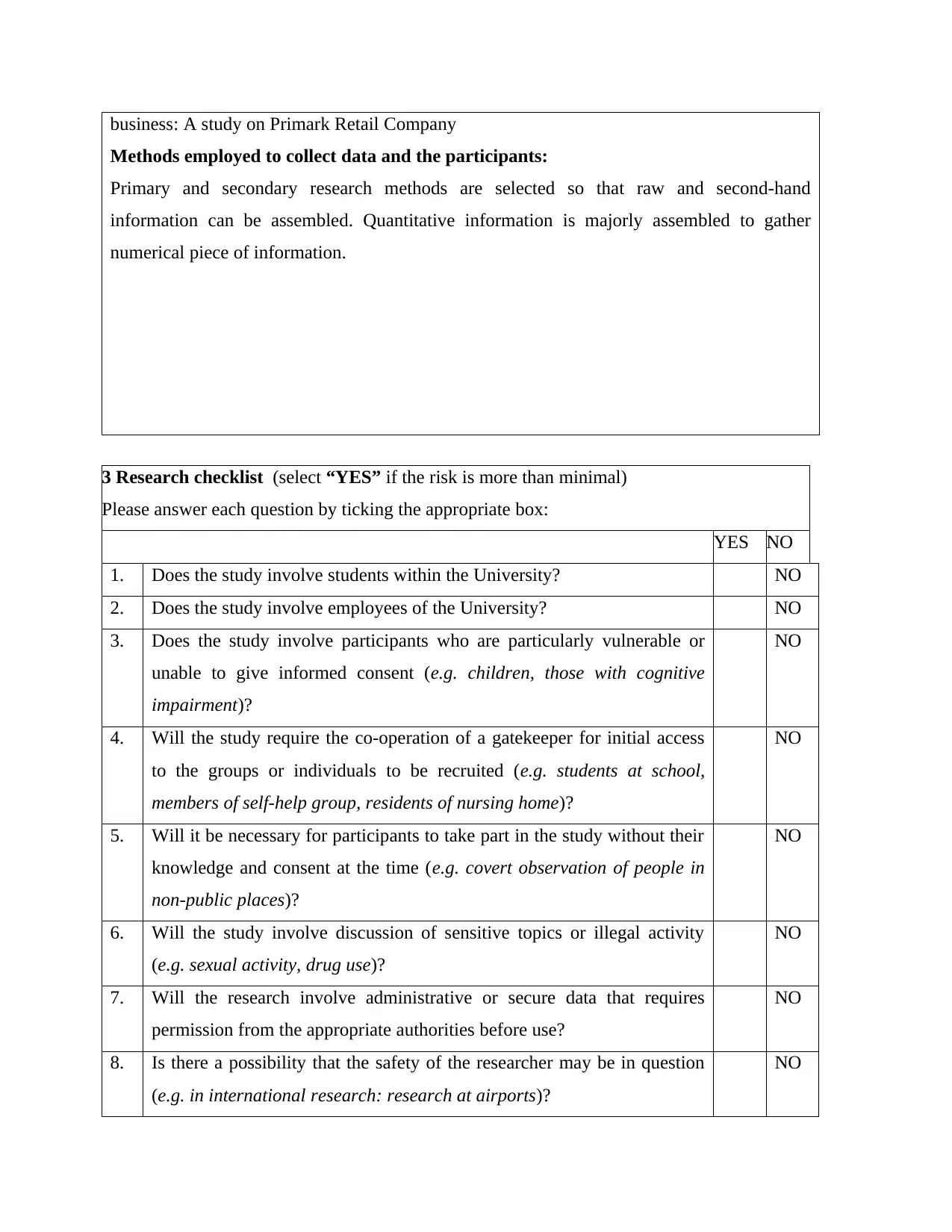
business: A study on Primark Retail Company
Methods employed to collect data and the participants:
Primary and secondary research methods are selected so that raw and second-hand
information can be assembled. Quantitative information is majorly assembled to gather
numerical piece of information.
3 Research checklist (select “YES” if the risk is more than minimal)
Please answer each question by ticking the appropriate box:
YES NO
1. Does the study involve students within the University? NO
2. Does the study involve employees of the University? NO
3. Does the study involve participants who are particularly vulnerable or
unable to give informed consent (e.g. children, those with cognitive
impairment)?
NO
4. Will the study require the co-operation of a gatekeeper for initial access
to the groups or individuals to be recruited (e.g. students at school,
members of self-help group, residents of nursing home)?
NO
5. Will it be necessary for participants to take part in the study without their
knowledge and consent at the time (e.g. covert observation of people in
non-public places)?
NO
6. Will the study involve discussion of sensitive topics or illegal activity
(e.g. sexual activity, drug use)?
NO
7. Will the research involve administrative or secure data that requires
permission from the appropriate authorities before use?
NO
8. Is there a possibility that the safety of the researcher may be in question
(e.g. in international research: research at airports)?
NO
Methods employed to collect data and the participants:
Primary and secondary research methods are selected so that raw and second-hand
information can be assembled. Quantitative information is majorly assembled to gather
numerical piece of information.
3 Research checklist (select “YES” if the risk is more than minimal)
Please answer each question by ticking the appropriate box:
YES NO
1. Does the study involve students within the University? NO
2. Does the study involve employees of the University? NO
3. Does the study involve participants who are particularly vulnerable or
unable to give informed consent (e.g. children, those with cognitive
impairment)?
NO
4. Will the study require the co-operation of a gatekeeper for initial access
to the groups or individuals to be recruited (e.g. students at school,
members of self-help group, residents of nursing home)?
NO
5. Will it be necessary for participants to take part in the study without their
knowledge and consent at the time (e.g. covert observation of people in
non-public places)?
NO
6. Will the study involve discussion of sensitive topics or illegal activity
(e.g. sexual activity, drug use)?
NO
7. Will the research involve administrative or secure data that requires
permission from the appropriate authorities before use?
NO
8. Is there a possibility that the safety of the researcher may be in question
(e.g. in international research: research at airports)?
NO
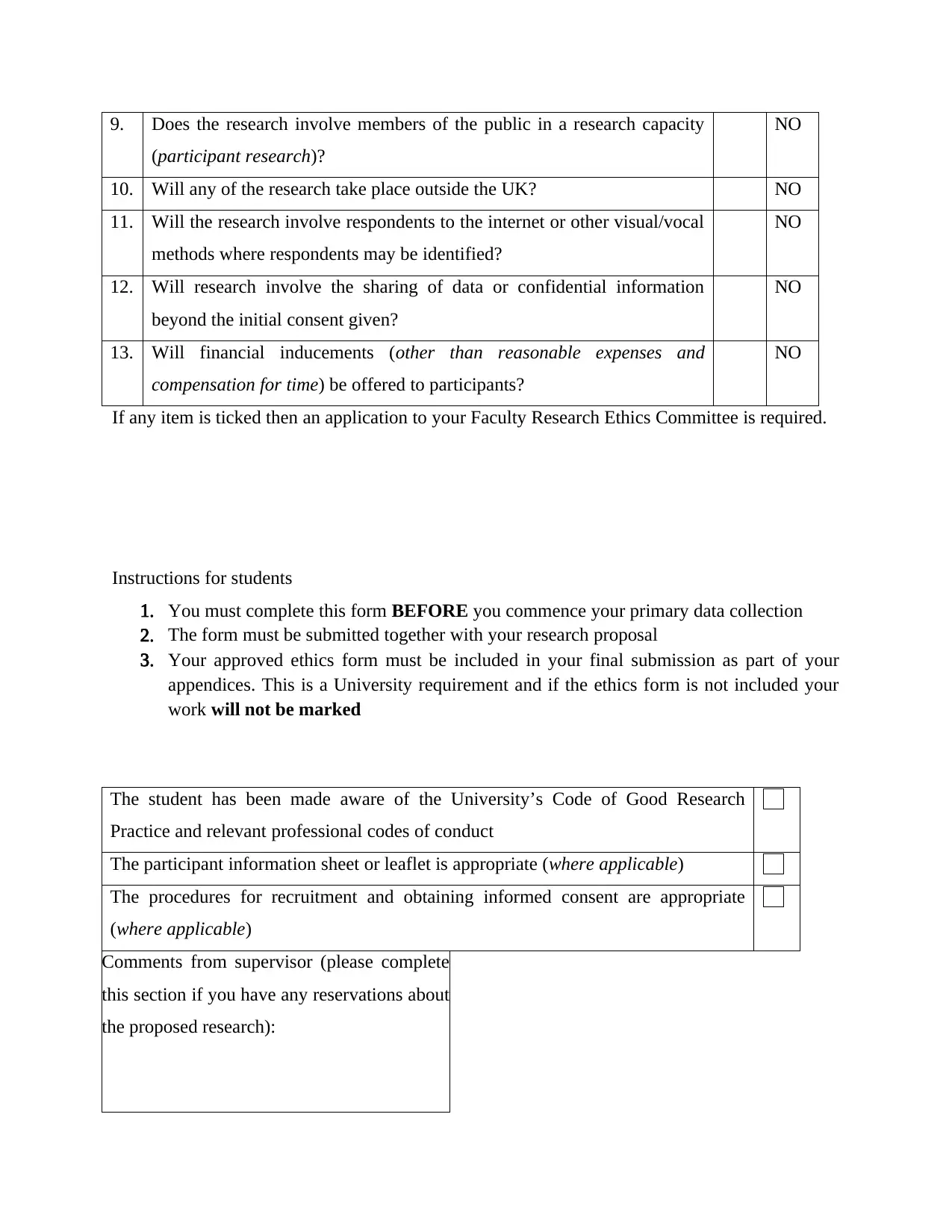
9. Does the research involve members of the public in a research capacity
(participant research)?
NO
10. Will any of the research take place outside the UK? NO
11. Will the research involve respondents to the internet or other visual/vocal
methods where respondents may be identified?
NO
12. Will research involve the sharing of data or confidential information
beyond the initial consent given?
NO
13. Will financial inducements (other than reasonable expenses and
compensation for time) be offered to participants?
NO
If any item is ticked then an application to your Faculty Research Ethics Committee is required.
Instructions for students
1. You must complete this form BEFORE you commence your primary data collection
2. The form must be submitted together with your research proposal
3. Your approved ethics form must be included in your final submission as part of your
appendices. This is a University requirement and if the ethics form is not included your
work will not be marked
The student has been made aware of the University’s Code of Good Research
Practice and relevant professional codes of conduct
The participant information sheet or leaflet is appropriate (where applicable)
The procedures for recruitment and obtaining informed consent are appropriate
(where applicable)
Comments from supervisor (please complete
this section if you have any reservations about
the proposed research):
(participant research)?
NO
10. Will any of the research take place outside the UK? NO
11. Will the research involve respondents to the internet or other visual/vocal
methods where respondents may be identified?
NO
12. Will research involve the sharing of data or confidential information
beyond the initial consent given?
NO
13. Will financial inducements (other than reasonable expenses and
compensation for time) be offered to participants?
NO
If any item is ticked then an application to your Faculty Research Ethics Committee is required.
Instructions for students
1. You must complete this form BEFORE you commence your primary data collection
2. The form must be submitted together with your research proposal
3. Your approved ethics form must be included in your final submission as part of your
appendices. This is a University requirement and if the ethics form is not included your
work will not be marked
The student has been made aware of the University’s Code of Good Research
Practice and relevant professional codes of conduct
The participant information sheet or leaflet is appropriate (where applicable)
The procedures for recruitment and obtaining informed consent are appropriate
(where applicable)
Comments from supervisor (please complete
this section if you have any reservations about
the proposed research):
Secure Best Marks with AI Grader
Need help grading? Try our AI Grader for instant feedback on your assignments.

Please leave blank Supervisor Use
I confirm that work as described will be carried out in full conformity to all ethical
standards and any additional professional requirements.
Name (please print):
Signed:
Date:
ETHICS SUB-
COMMITTEE
APPROVAL
Name Remark Sign Date
*Please leave blank (Instructions for supervisors)
Please check the appropriate boxes. Even if the student has answered ‘no’ to all questions in
Section 3, the study should not begin until all boxes have been checked and the form has been
approved by you.
I confirm that work as described will be carried out in full conformity to all ethical
standards and any additional professional requirements.
Name (please print):
Signed:
Date:
ETHICS SUB-
COMMITTEE
APPROVAL
Name Remark Sign Date
*Please leave blank (Instructions for supervisors)
Please check the appropriate boxes. Even if the student has answered ‘no’ to all questions in
Section 3, the study should not begin until all boxes have been checked and the form has been
approved by you.

1 out of 12
Related Documents
Your All-in-One AI-Powered Toolkit for Academic Success.
+13062052269
info@desklib.com
Available 24*7 on WhatsApp / Email
![[object Object]](/_next/static/media/star-bottom.7253800d.svg)
Unlock your academic potential
© 2024 | Zucol Services PVT LTD | All rights reserved.





